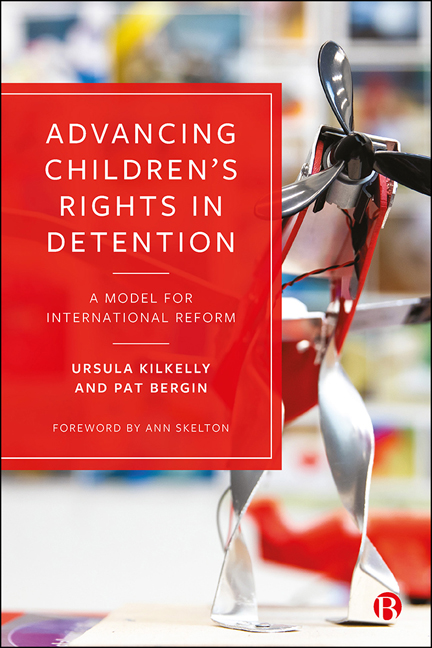Book contents
- Frontmatter
- Contents
- List of Cases and Instruments
- List of Figures
- About the Authors
- Acknowledgements
- Foreword
- Introduction
- 1 Children’s Rights in Detention
- 2 An International Perspective
- 3 Irish Youth Justice Law and Policy
- 4 Introducing Child Detention in Ireland
- 5 Oberstown and the Process of Change
- 6 Implementing Children’s Rights in Detention
- 7 Children’s Rights to Protection from Harm
- 8 Staff Wellbeing and Communication
- 9 International and National Influences and Advocacy
- 10 Reflections: Enablers and Barriers to Reform
- Afterword
- References
- Index
7 - Children’s Rights to Protection from Harm
Published online by Cambridge University Press: 13 May 2022
- Frontmatter
- Contents
- List of Cases and Instruments
- List of Figures
- About the Authors
- Acknowledgements
- Foreword
- Introduction
- 1 Children’s Rights in Detention
- 2 An International Perspective
- 3 Irish Youth Justice Law and Policy
- 4 Introducing Child Detention in Ireland
- 5 Oberstown and the Process of Change
- 6 Implementing Children’s Rights in Detention
- 7 Children’s Rights to Protection from Harm
- 8 Staff Wellbeing and Communication
- 9 International and National Influences and Advocacy
- 10 Reflections: Enablers and Barriers to Reform
- Afterword
- References
- Index
Summary
Introduction
Chapter 6 considered the extent to which Oberstown Children Detention Campus has implemented the rights-based model of detention. While noting the progress made in the advancement of children's rights to child-centred care, provision of need and preparation for leaving, the chapter concluded by noting the potentially transformative effects of fulfilling children's rights under the themes of participation and partnership.
This chapter notes that protection rights are fundamental to children's rights in detention in two ways. First, they relate to children's need for protection with respect to trauma or injury experienced prior to coming to Oberstown. Second, they concern children's right to protection from harm while in detention, including measures taken to protect themselves or others from injury. In exploring this important and challenging area, this chapter pays particular attention to restrictive practices such as separation and restraint, which have, as Chapter 2 noted, continued to threaten children's protection rights around the world. In this context, this chapter identifies the measures taken to improve children's rights to protection in Oberstown, highlighting some of the steps that have helped the transition towards a more rights-compliant approach.
Safeguarding
Every child in detention has a right to be protected from harm and ill-treatment – under Article 19 of the United Nations Convention on the Rights of the Child (CRC) – and in light of the fact that children can be ‘highly vulnerable’, especially during the initial period of detention (European Rule 109), states are required to take measures to ‘protect their physical and mental integrity and foster their well-being’ (European Rule 52.1). Particular care must be taken of children who have experienced physical, mental or sexual abuse (European Rule 52.2) and measures must be in place to identify, report and follow up instances of maltreatment (Articles 19 and 39, CRC).
Oberstown complies with the national legislative safeguarding framework, based on the Children First Act 2015, and has an established system in place for the reporting, referral and follow-up of instances of harm and ill-treatment. A range of measures are in place to ‘safeguard children and protect them from abuse’ and safeguarding training is efficient and regular (HIQA, 2018, p 28). A full- time social worker performs the role of ‘designated liaison person’ to whom all referrals are made for onward reporting to the national authority – Tusla, the Child and Family Agency.
- Type
- Chapter
- Information
- Advancing Children's Rights in DetentionA Model for International Reform, pp. 105 - 121Publisher: Bristol University PressPrint publication year: 2021



